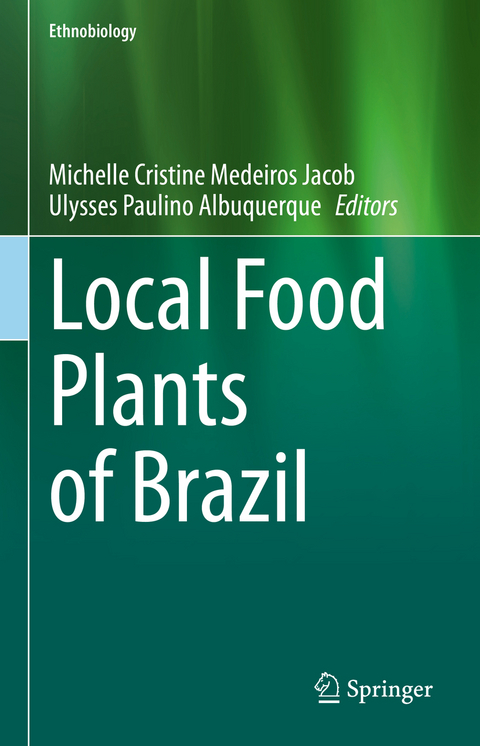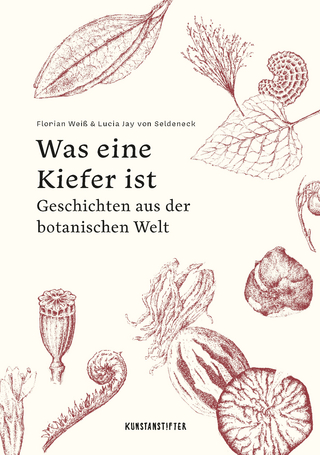
Local Food Plants of Brazil
Springer International Publishing (Verlag)
978-3-030-69138-7 (ISBN)
This book presents the current state of knowledge on local Brazilian food plants through a multidisciplinary approach, including an overview of food plants in Brazil, as well as comprehensive nutritional data. It compiles basic theories on the interrelationship between biodiversity and food and nutrition security, as well as ethnobotanical knowledge of local Brazilian food plants. Additionally, this title provides various methods of learning and teaching the subject, including through social media, artificial intelligence, and through workshops, among others.
lt;b>Prof. Ulysses Paulino Albuquerque received his Ph.D. in biology in 2001 from the Universidade Federal de Pernambuco, Brazil. He is Full Professor of the Department of Botany at Universidade Federal de Pernambuco, Pernambuco, Brazil. In 2011, he led the founding of new Ph.D. program in Ethnobiology and Nature Conservation. Albuquerque has published around 316 journal articles, 200 chapter's book and edited or authored 50 books (including new editions and translations). Albuquerque has served as editor of various peer-reviewed journals, and in 2011 co-founded the journal Ethnobiology and Conservation as Co-Editor-in-Chief.
Prof. Michelle Jacob is a professor in the Nutrition Department and the postgraduate program of Social Sciences at the Federal University of Rio Grande do Norte. She is the founder of LabNutrir (www.nutrir.com.vc), a community garden laboratory in an undergraduate nutrition program that brings together local plants and people. The United Nations in 2018 recognized the LabNutrir as a reference in the application of the Right to Food Guidelines, especially guideline 11, i.e., education and awareness-raising. Dr. Jacob's research interests relate to food and nutrition security, sustainable diets, ethnonutrition, and food systems.
Preface.- Part 1. Basics on Food Plants and Biodiversity in a Multidisciplinary Approach.- Food Biodiversity Key Concepts.- Food Systems towards Food and Nutrition Security: The Food Biodiversity Role.- Biodiversity, Cultural Diversity and Food Cultures.- Unconventional Food Plants: Food or Medicine?.- The Potential of Unconventional Food Plants for Improving Diets and Nutrition.- Part 2. Brazilian Food Plants: An Overview.- Brazilian Unconventional Food Plants and National Policies to Strengthen Food and Nutrition Security through Biodiversity.- Food Plants from Brazilian Biodiversity as a Source of Bioactive Compounds.- Natural Toxins in Brazilian Unconventional Food Plants: A Review.- Part 3. Ethnobotanical Knowledge of Brazilian Food Plants.- Brazilian Food Plants Reported by Scientific Travelers and Naturalists: Key Plants from the Past to the Future.- Brazilian Food Plants and Indigenous People: Trends in Archaeobotany.- Famine Foods: Thoughts from a Caatinga Research Experience.- Part 4. Nutritional Composition Data on Brazilian Food Plants by Biome.- Food Plants in Cerrado.- Food Plants in Caatinga.- Food Plants in Pampas.- Food Plants in Amazonia.- Food Plants in Pantanal.- Food Plants in Atlantic Rainforest.- Part 5. Consumption of Brazilian Food Plants.- Challenges to Assess Sustainable Diets in Nutritional Science: A Case Study in Caatinga Biome.- Potential for Popularization of Unconventional Food Plants Based on Local Perception.- Potential of Unconventional Food Plants Value Chains.- Food Plants of Brazilian's Sociobiodiversity in the National School Feeding Program.- Part 6. Learning and Teaching Brazilian Food Plants.- E-Learning through Social Networking Sites: A Case Study from Facebook.- Plant Identification Using Artificial Intelligence: Innovative Strategies for Teaching Food Biodiversity.- A Garden Laboratory: Food Biodiversity Research Skills for Nutrition Students.- The "PANC na City" and "Horta City Lapa" Experiences: Learning and Teachingon Unconventional Food Plants in the Brazilian Urban Context.- Food Sovereignty for Lunch: Workshops in an Unconventional Farm.- Index.
| Erscheinungsdatum | 05.06.2021 |
|---|---|
| Reihe/Serie | Ethnobiology |
| Zusatzinfo | XVII, 417 p. 35 illus., 32 illus. in color. |
| Verlagsort | Cham |
| Sprache | englisch |
| Maße | 155 x 235 mm |
| Gewicht | 771 g |
| Themenwelt | Naturwissenschaften ► Biologie ► Botanik |
| Naturwissenschaften ► Biologie ► Ökologie / Naturschutz | |
| Technik ► Lebensmitteltechnologie | |
| Schlagworte | biodiversity • Economic Botany • ethnobiology • ethnobotany • Food and nutrition security • Sustainable diets |
| ISBN-10 | 3-030-69138-1 / 3030691381 |
| ISBN-13 | 978-3-030-69138-7 / 9783030691387 |
| Zustand | Neuware |
| Informationen gemäß Produktsicherheitsverordnung (GPSR) | |
| Haben Sie eine Frage zum Produkt? |
aus dem Bereich


